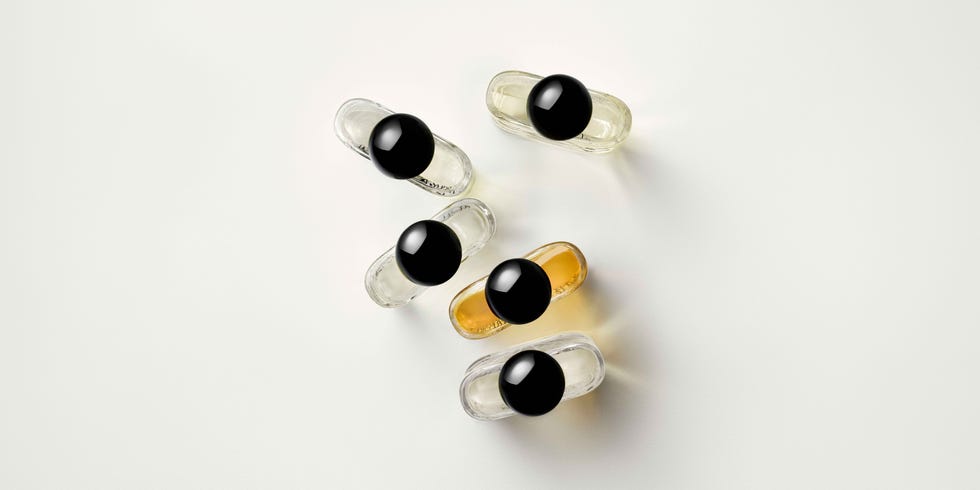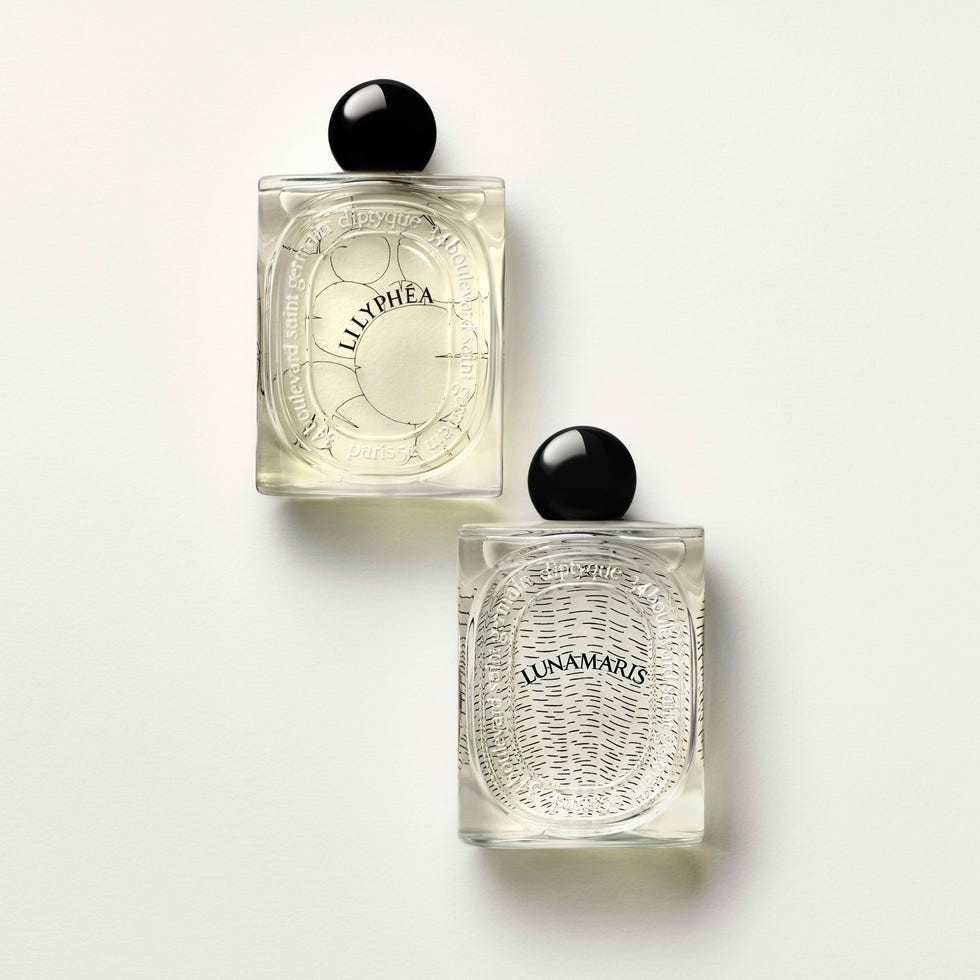Close your eyes, and picture coral underwater, swaying like vibrant tree branches. Now, try to imagine what this coral might smell like. You and I will most likely never know for sure (unless we’re both certified scuba divers), but we can guess that it might be a bit minerally, salty, warm, and almost floral. Now, let’s try to imagine the aromas for other objects—what about luminous mother of pearl, or the languid water lilies in a Claude Monet painting?
Diptyque Paris, the French fragrance house beloved for their candles, is trying to answer the question of “What would this smell like?” with their new perfume collection, Les Essences de Diptyque. Over its nearly 65-year tenure, the brand’s fragrances have always drawn inspiration from art, history, travel, and nature, playing with scent to reconstruct memories or places. For the new collection, Diptyque is expanding this tradition by imagining scents for natural treasures, or natural elements with no discernible scent, such as a rosette crystal rock formation (also known as a desert rose).
To make these intriguing scents, the brand enlisted perfumers Fabrice Pellegrin, Alexandra Carlin, Nathalie Cetto, and Olivier Pescheux to imagine olfactory compositions that encompass five different elements: Coral, mother of pearl, tree bark, water lily, and desert rose. “The idea was really to give a fantastic playground to the perfumers, letting their imagination wonder about what would these ingredients smell [like],” says Laurence Semichon, CEO of Diptyque Paris.
Lunamaris, by perfumer Fabrice Pellegrin, brings mother of pearl to life. It’s a soft, mineral-forward scent that blends rock rose, pink peppercorn, and incense for an understated finish. Bois Corsé, by Cetto and Pescheux, offers a lively translation of tree bark—it smells like the most elevated Irish coffee imaginable, thanks to notes of black coffee. Sandalwood lends an unmistakable milkiness to the scent, and tonka bean helps keep it soft and wearable. Inspired by Claude Monet’s waterlilies, Lilyphéa, by Cetto and Pescheux, is an aquatic scent laced with hints of violet leaves, vanilla, and cardamom. Rose Roche, by Pellegrin, turns the intricate crystal formations of desert rose into a rose scent unlike any other. Blended with lemon and mineral patchouli, the rose takes on an almost effervescent quality, like charged desert winds. Finally, Corail Oscuro, an interpretation of the scarlet coral found in the Venetian Lagoon, blends rose bourbon absolute with mandarin and a salty, mineral accord.
Not only are the scents slightly different from Diptyque’s typical fragrances, but the bottle design—clear glass with conceptual illustrations by artist Nigel Peake—is also new. Diptyque’s black-and-white oval logo has become something of an icon for the brand, and Les Essences de Diptyque etches it directly into recycled glass. Each oval acts as a portal to see the abstract illustrations on the back of the bottles.
“It has always been so important for the brand to convey visually the idea of the scent before people can even smell it,” Semichon says. This is true of well-known Diptyque scents like Philosykos, an ode to the fig tree, which has a sketch of fresh figs and a lush Greek garden on the bottle, or Eau Rose, a rose scent that’s covered in intricate drawings of the flower. “You have [drawings] on all the labels, they are rich, they are detailed, and they really are a micro-world.” The drawings on Les Essences de Diptyque bottles are much more abstract than the brand’s typical artwork. Semichon explains that these pared down drawings help convey, rather than dictate, a sense of the fragrance within. Corail Oscuro has an outline of coral, while Lunamaris has short, staccato lines indicative of the iridescent surface of mother of pearl.
This also marks the brand’s first foray into more luxury perfumes. Each bottle has a slightly higher fragrance concentration than other Diptyque scents, is made with prestige ingredients like rock rose and Australian sandalwood, and is priced at $330. Though Les Essences de Diptyque marks a new era for the fragrance house, these scents still capture the heart of the brand. Semichon believes that the three original friends and Diptyque founders, Christiane Gautrot, Desmond Knox-Leet, and Yves Coueslant would make these scents, if they had the chance. “They would have loved to have this creative challenge of imagining scents of ingredients that don’t have a smell,” she says. “It’s loyal to their spirit, their curiosity, and [philosophy of] finding beauty everywhere, even in places where you don’t obviously see it.”
Niche fragrances are the trend du jour—everyone wants to smell unique. Les Essences de Diptyque meets this moment in scent, with these novel inspirations. Who wouldn’t want to scent themselves with mother of pearl, or the rare rock formation desert rose? Being able to tell anyone who inquires that you smell like Venetian coral is as distinctive as it gets.

Katie Berohn is the Beauty Assistant at Good Housekeeping, Woman’s Day and Prevention magazines, all part of the Hearst Lifestyle Group. She graduated from the University of Colorado, Boulder, with a major in journalism and minor in technology, arts, and media, and earned her Master’s Degree at NYU’s Graduate Program of Magazine Journalism. In addition, Katie has held editorial internships at Denver Life Magazine, Yoga Journal, and Cosmopolitan, a digital editorial internship at New York Magazine’s The Cut, a social good fellowship at Mashable, and has freelanced for HelloGiggles. _When she’s not obsessing over the latest skincare launch or continuing her endless search for the perfect shade of red nail polish, Katie can be found in a hot yoga class, trying everything on the menu at New York’s newest restaurant, or hanging out at a trendy wine bar with her friends.


